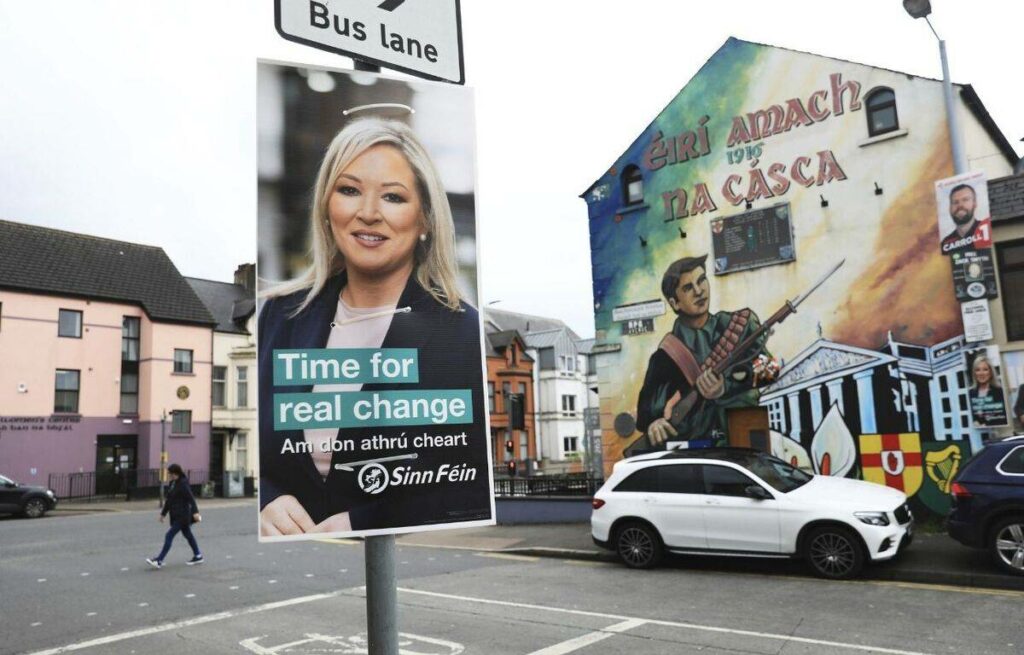This Thursday, all Britons over the age of 18 are being called to vote to participate in the local elections. If in England, Scotland or Wales, the results will be rather revealing of the popularity of Boris Johnson, in Northern Ireland, the vote will have far greater consequences than a simple game of political chairs. Indeed, the victory of the pro-reunification party Sinn Féin, which the polls give the lead, could redefine the cartography of the United Kingdom. Explanations.
Why are these elections so important in Northern Ireland?
To understand the importance of these elections, you have to look at the structure of English elections for two minutes (we promise, we keep it simple). Local elections in Northern Ireland are not the same as in the rest of the UK. « These are regional elections: 90 MPs must be elected to the Northern Irish Assembly, which manages all matters concerning the region, from agriculture to tourism, including justice, education and the police », summarizes for 20 minutes Christophe Gillissen, professor of Irish studies at the University of Caen.
It is therefore not exactly the same type of election as in the rest of the United Kingdom, where local elections make it possible to elect councilors to local authorities, who have less power than the Northern Irish Assembly. Indeed, the latter appoints a regional executive, including the Prime Minister and the Deputy Prime Minister, the Minister of Justice, etc. The Assembly and the executive are institutions created by the Good Friday Agreement (1998), a central piece of the peace process. « In these institutions, the former enemies, Catholic nationalists and Protestant unionists, work together to govern the region », specifies Christophe Gillissen.
What is the Sinn Féin party?
Sinn Féin is a nationalist political party whose « major objective is the reunification of Northern Ireland (currently a region of the United Kingdom) and the Republic of Ireland », explains Christophe Gillissen. Although its influence is more limited in the Republic of Ireland, it is the second largest political party in Northern Ireland and the main denominational party for Catholics in this region. “The party is sometimes criticized because at the time of the conflict in Northern Ireland (1968-1998), it was the political showcase of the Irish Republican Army, a clandestine organization which committed numerous attacks, indicates the professor of Irish Studies. But today, Sinn Féin is a constitutional party, opposed to violence. »
At its head since 2017, politician Michelle O’Neill. Since Brexit, the latter has made no secret of its intention to organize a referendum for reunification between the Republic of Ireland and Northern Ireland. “The only solution to Brexit chaos is unification. The question is no longer whether, but when the referendum on reunification will be held”, she had thus declared in November 2019, on the occasion of her annual congress, baptized “the time of reunification”. This Thursday on Twitter, his party wrote: “Today we can elect a Prime Minister for all. Let’s seize this historic moment. Difficult to be clearer on their intentions.
What can the results of these elections change?
It is the first time in 100 years that the polls have given Sinn Féin the lead in the Local Assembly with 26% of the vote, an eight point lead over its main opponent: the conservative DUP (Democratic Unionist Party or Democratic Unionist Party). Party), supporter of a Northern Ireland attached to the United Kingdom. With only 19% of the voting intentions, the first party of the outgoing assembly finds itself behind, neck and neck with the centrist Alliance party.
If Sinn Féin wins, Michelle O’Neill would become leader of the local government in which nationalists and unionists have cohabited since the 1998 peace accord. Although Sinn Féin has not focused its campaign on a referendum for the reunification, but rather insisted on the crisis of purchasing power, « such a victory would make the prospect of a reunification of Ireland more probable », advances Christophe Gillissen.
But a second option is also possible. The DUP has already warned that it will refuse to appoint a deputy prime minister and rule with Sinn Féin, unless the UK government suspends the province’s post-Brexit special status. « This would lead to a period of institutional paralysis for Northern Ireland », analyzes the professor of Irish studies. Polling stations close at 9 p.m. GMT tonight and the first results will be known overnight from Thursday to Friday. Verdict in the next few days.


